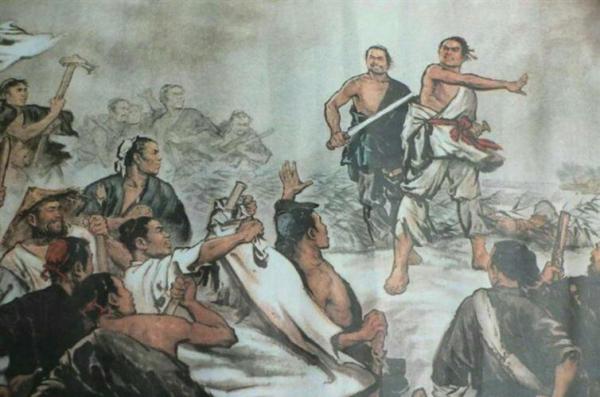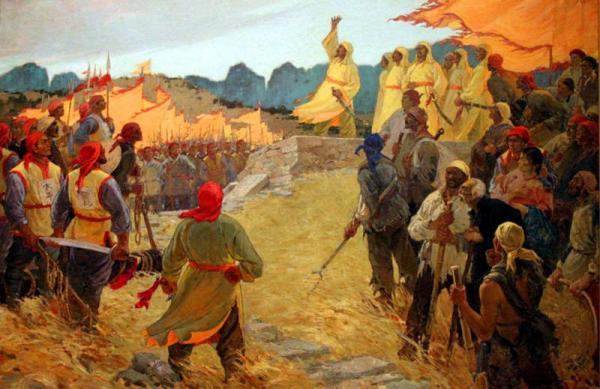Top 9 Peasant Revolts in Ancient China
According to the records, there were 40+ notable peasant revolts against the then rulers of different dynasties in Chinese history. Most of these peasant uprisings came from two major reasons: natural calamities like drought or flood resulted in famines in large areas, and the governments at different levels couldn’t help the victims; usually at the end of the dynasties, it always happened that the nobility and powerful landlords seized most of the lands from the peasants, many of them could not survive and became refugees and exiles away from home.
In the mindset of average Chinese people, if the emperor can’t protect his people, then he is thought that he loses the heavenly mandate of ruling the empire, another qualified person is allowed to replace him as the new emperor based on the philosophy of Mencius. Therefore, there has been a self-motivation banter among uprisingsg the folks “People take turns to be the emperor; the chance may fall on me next year”. In the turmoil period, if several heroes could spark the defiant anger of victims, then they would launch a spontaneous peasant uprising immediately and attracted thousands of followers. Among these large and small-scale peasant rebellions, very few finally succeeded and established their own regime.
Here below we are going to list 9 most influential peasant revolts in Chinese history and explore the possible reasons most of these revolts failed.
1. Dazexiang Peasant Revolts in Qin Dynasty, started in 209BC, lasting for 6 months
It has been regarded as the first large-scale peasant revolt in Chinese history, led by Chen Sheng and Wu Guang during late Qin Dynasty. Together with other recruited peasants, they were expected to arrive in Yuyang for border defense before the deadline, but the torrential rain damaged the path to their destination. So they estimated that they would miss the specific date. But according to the Qin law, if they fail to do that, all the people will have to be decapitated by the government. Then they decided to kill the officers and stage an uprising. After conquering some towns, they established their own regime called "Zhang Chu".

The revolt leader Chen Sheng made a loud outcry: "Is there anyone born to be a king, duke, general and minister?!". This uprising fundamentally undermined the governance of the Qin Dynasty, created favorable conditions for the later revolts led by Xiang Yu and Liu Bang to ruin Qin’s regime, and played an important exemplary role in the history of Chinese peasant rebellions.
2. Lulin Chimei Peasant Uprising in Wang Mang’s Regime, started in 17AD, lasting for 10 years
As soon as Wang Mang took over the power from the Western Han emperor, he carried out a series of political and economic reforms to ease the social tension. While on the contrary, what he had done almost offended all the people at different classes, causing chaos in the country.
Due to the famine in Jingzhou area, Wang Kuang and Wang Feng called on the refugees to launch an uprising against the government in 17AD. They set Lulin Mountain as their headquarters base. Their army was named after the mountain. In Shandong Area, another uprising troop was led by Fan Chong. To distinguish themselves from their enemies, they all painted their eyebrows into red color, hence, the name Chimei (Red Eyebrows) Army. Both of the armies defeated the Wang Mang’s troops, and later overthrew Wang’s regime. During the period, some powerful landlords in Nanyang area (in current Henan) also joined the rebellion. One of them called Liu Xiu was the descendant of the first emperor Liu Bang of Han Dynasty. He was not entitled to the hereditary peerage during the previous dynasty, but finally became the one who laughed last and established the Eastern Han Dynasty after wiping out all the peasant armies in the end.
3. Huangjin Peasant Revolt in Eastern Han Dynasty, started in 184AD, lasting for 1.5 years
In the last years of the Eastern Han Dynasty, a peasant revolt was led by brothers Zhang Jiao and Zhang Bao. They adopted a self-initiated religion - Taiping Taoism as the means to widespread their thoughts and ideas. Due to the corruption of the bureaucracy, heavy corvée and military service, extreme land concentration and mergers, and severe drought across the country, no grains were harvested and taxes were not reduced, all these reasons eventually led to the peasant uprising.
Zhang Jiao founded Taiping Taoism to win people's hearts and full support through the religion, and established prestige among poor peasants, with hundreds of thousands of believers in different parts of the country. His slogan was “Dark Heaven is dying, it is ready to have Yellow Heaven now”. All the revolt participants wore the yellow headcloth as an important sign. Unfortunately the rebellion was soon brutally suppressed by the Eastern Han emperor. This uprising accelerated the collapse of the Eastern Han Dynasty. Soon after that, the Eastern Han emperors gradually lost their control of the whole state.
4. Wagang Peasant Uprising in Sui Dynasty, started in 611AD, lasting for 7 years
After the second emperor of Sui Dynasty Yang Guang ascended the throne, he launched lots of enormous projects like building the Grand Canal and Eastern Capital of the state and waged three wars against the neighboring country Kogruyo (current northern Korea). At the same time, Some areas of Shandong and Henan suffered from the floods and later drought, thousands of poor and starving peasants could not survive without the relief of the government. Under the leadership of Zhai Rang and Li Mi, they staged a revolt against the emperor of Sui Dynasty.
With the continuous victories of the Wagang Army, Li Mi’s ambition began to inflate. Later he killed the No. 1 leader Zhai Rang and seized the power in his hand. But the army was no longer as cohesive as before, and finally defeated by Sui General Wang Shichong. In 618, Li Mi led the remaining solders to join another army led by Li Yuan, who became the founder of Tang Dynasty.
5. Huang Cao Peasant Revolt in Tang Dynasty, started in 878AD, lasting for 6 years
At the end of the Tang Dynasty, the bureaucratic system turned so corrupt, corvée and taxes on peasants were heavy, it also came together with the natural disasters. The life of peasants became miserable and hopeless. Inspired by another revolt in Henan, Huang Chao led the peasants to rebel in Shandong.
The rebellion was the longest, largest and most influential peasant revolt in the last years of the Tang Dynasty. The uprising army kept fighting from one place to another and covered nearly most part of the empire. In 881, Huang Cao established his regime called "Daqi" in Chang'an and succeeded in becoming an emperor. But one year later, the Tang emperor Xizong fought back. Huang Cao had to retreat from his capital, later he was assassinated by one of his generals at Mount Tai in 884. However, the uprising seriously shook the foundation of Tang Dynasty. 23 years later, Tang Dynasty came to an end after the failure of Huang Cao uprising.
6. Fang La Peasant Revolt in Northern Song Dynasty, started in 1120, lasting for 1 year
In the late Northern Song Dynasty, the Emperor Huizong indulged himself in precious flora and weird-looking rocks by collecting all these treasures to build his royal garden. He and his bureaucratic system imposed too much pressure on average people. Fang La led the crowd to revolt in Qixian Village, She County, calling himself "Sheng Gong". During his prime time, he controlled the territory of 52 counties of six prefectures, with an army of nearly one million. But he was captured by the Song troops during a campaign and sentenced to death 4 months later.
7. Hongjin Army Peasant Uprising in Yuan Dynasty, starting in 1351, lasting for 12 years
During Yuan Dynasty, the Mongolian rulers were so brutal to the majority Han people. Actually it was very challenging for the nomadic tribe leaders to govern a big agrarian state like China. Shortly 80 years after the founding of Yuan Dynasty, the uprising of the Red Headcloth (Hongjin) Army broke out in 1351, which dealt a heavy blow to the Mongolian regime in the central areas of the country. This led to a situation in which several warlords such as Zhu Yuanzhang, Chen Youliang, and Zhang Xianzhong competed for the throne. Others were finally defeated by Zhu Yuanzhang, who established the Ming Dynasty.
8. Li Zicheng Peasant Revolt in Ming Dynasty, starting in 1629, lasting for 16 years
At the end of the Ming Dynasty, the state experienced serious internal and external troubles: sharp class conflicts, and constant natural and man-made disasters. Due to the drought and famine in Shaanxi, peasants could not even live a minimal life. Li Zicheng joined one uprising army and later became the leader. He put forth a slogan: “Equalization of land ownership, exemption from land tax”, which obtained the great support of peasants.
In 1644, he defeated the Ming army and entered Ming’s capital – Beijing. The last emperor Chongzhen committed suicide by hanging himself on a tree at Coal Hill. But Li’s Dashun regime didn’t last long in Beijing. Soon after that, Manchurian army came and drove Li and his followers out of the capital. With the help of former Ming’s betrayed generals, Manchurian armies swept in the whole country. Li Zicheng and his soldiers could not resist the attack. Later he was accidentally killed by the military guards of local landlords in Hebei in 1645. Although the uprising ended in failure, it dealt a devastating blow to Ming Dynasty and overthrew the regime.
9. Taiping Peasant Revolt in Qing Dynasty, started in 1851, lasting for 13 years
The peasant peasant rebellion was initiated by Hong Xiuquan from Jintian Village in Guangxi against the rulers of the Qing Dynasty and foreign aggression, which became the largest anti-Qing movement in the mid-19th century. In 1853, Hong Xiuquan set Nanjing as the capital of Taiping Heavenly Kingdom, and ascended the throne as Heavenly King. His territory expanded to 17 provinces all over the country. History repeated itself. When the rebellion secured the initial stage success, the leader group began to split, which caused the military power greatly decline. In 1864, the Qing armies broke into Nanjing, which marked the failure of Taiping Rebellion.

Western scholars estimated that the Taiping Rebellion is believed to have claimed between 20 million and 70 million lives, making it one of the deadliest conflicts in human history.
The above is the brief introduction of the 9 influential peasants uprising in the history of China. Actually it is not that easy to explain in a short article the reasons why most of the ancient Chinese peasant rebellions failed in the end. Here we just named those major ones for your references:
Why Most of the Chinese Peasant Revolts Failed?
1.After winning in the early stage, the leadership group began to forget where and why they had started, turning decadent like those they fought against
The biggest advantage of the peasants was their endurance of hardships and humiliation; their biggest weakness was that they had no foresight and lacked of self-control. They could overcome the unimaginable hardships at the beginning. When there was no hidden crisis in sight, they impatiently wanted to indulge their bodies, those long-suppressed natures burst out like volcanoes, and all kinds of desires inflated so rapidly that they forgot who they were. In front of the dazzling gold, silver, jewelry and pretty women, they quickly got lost, and indulged in the depraved life they once hated. Therefore, they didn’t have the strong determination and willpower to push forward their movement.
2.Lack of cooperation skills led to the division and internal friction of the leadership group
Any emerging power has two most deadly crises: one is corruption, completely abandoning their original intention and goal; the other is the inability to unite from beginning to end, which may cause a series of infighting. The peasant regime, based on the inherent weakness of the peasants, could not survive the crisis in two aspects. The most deadly thing is that most of the peasant leaders didn’t have a broad mind once they took over the power. One of their major concerns turned that they had to be on guard against the people around them to seize power from their own hands. They usually could no longer inspire and motivate their subordinates to consistently fight hard towards the ultimate goal.
3.Lack of holistic thinking skills and negligence of state power construction
In many cases, peasant leaders often did not have a clear long term goal. They only focused on immediate interests, and only remained at the low-level struggles such as revenge, killing and plundering wealth to satisfy the current needs. Therefore, we say the peasant leaders lacked political acumen and did not pay attention to political power construction. Every time they conquered a place, the main task of peasant soldiers was to kill the officials and the rich, and robbed the locals, instead of establishing their own regime there to stabilize the place and gain full support of local citizens. They usually did not have the idea of collecting taxes in the conquered areas to replenish military supplies, but relying on the plunder to solve the supply problem.
As we all know, plundering is not sustainable, which also leads to strong resistance and social chaos; taxation is a long-term operation, and as long as the tax is reasonable, resistance is low or even nonexistent. Therefore, after destroying the old ruling order of the previous dynasty, if the peasant leaders themselves cannot restore the political, economic and social order in his state, they cannot enjoy the fruits of new regime for a long time.
4.Due to the long and heavy suppression, insurgents were more likely to revenge irrationally during the process of uprising, they failed to win the ordinary people's hearts
Perhaps out of ignorance and jealousy, almost all peasant regimes hated scholars and intellectuals, especially those working in the ruling government. After the peasant leaders took over power, many educated people became the scapegoats of the former regime. They were mercilessly attacked, robbed and exterminated.
Actually the educated class are more prudent and visionary than most of the peasants. They can make up for the shortcomings of the peasants and are indispensable for building and consolidating the new regime. Therefore, the peasant leaders should make use of these people to serve the new regime. The failure of the peasant leaders to establish the broadest united front with intellectuals, even the former officials and nobility of old regime, is also an important reason most of the uprising leaders could not maintain a stable and peaceful situation in the early stage of his governance.
Based on above 4 major reasons, only two leaders of peasant revolts of China Liu Bang of Han Dynasty and Zhu Yuanzhang of Ming Dynasty, who could handle all those things well, finally set up their new regimes, and became the first emperors of the respective dynasties.


